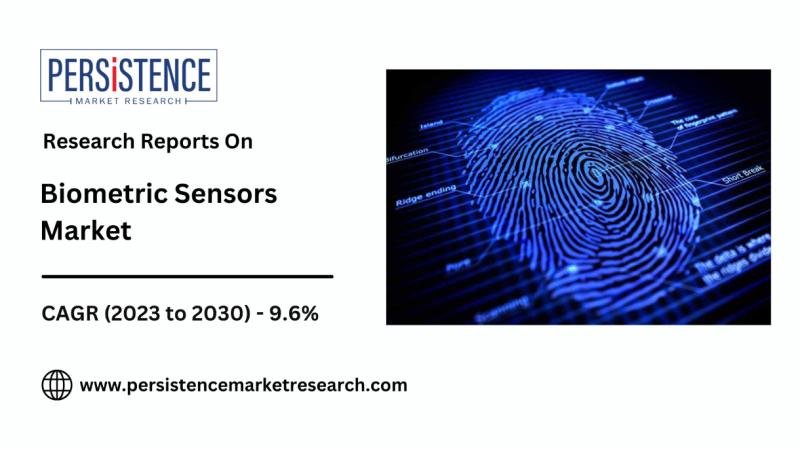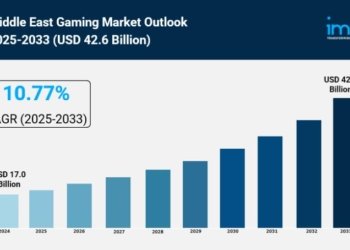The biometric sensors market has been experiencing exponential growth, driven by increasing security needs, technological advancements, and a surge in demand across various industries. Among the regions, the Asia-Pacific (APAC) is emerging as the frontrunner in this market, projected to dominate the landscape by 2030. This article explores the factors contributing to this dominance, the key trends shaping the market, and the potential challenges that may arise.
𝐑𝐞𝐪𝐮𝐞𝐬𝐭 𝐟𝐨𝐫 𝐒𝐚𝐦𝐩𝐥𝐞: https://www.persistencemarketresearch.com/samples/33611
𝐁𝐢𝐨𝐦𝐞𝐭𝐫𝐢𝐜 𝐒𝐞𝐧𝐬𝐨𝐫𝐬 𝐌𝐚𝐫𝐤𝐞𝐭 𝐎𝐯𝐞𝐫𝐯𝐢𝐞𝐰:
The global biometric sensors market is projected to grow at a CAGR of 9.6%, increasing from USD 19 billion in 2023 to USD 36.1 billion by 2030. Biometric sensors are advanced devices designed to detect and analyze unique biological or behavioral traits, such as fingerprints, facial structures, iris patterns, voice patterns, and gait. By converting these attributes into digital data, they enhance security systems, access control, and personal device authentication, providing a more secure and convenient alternative to traditional methods like passwords.
The market is experiencing significant growth driven by heightened security concerns and the rising demand for efficient authentication methods. Technological advancements are facilitating a shift from conventional fingerprint recognition to broader modalities, including facial and voice recognition, and behavioral biometrics. Industries such as healthcare, finance, government, and automotive are increasingly adopting these solutions to improve security protocols and streamline access control processes, further propelling market expansion.
𝐑𝐢𝐬𝐢𝐧𝐠 𝐃𝐞𝐦𝐚𝐧𝐝 𝐟𝐨𝐫 𝐄𝐧𝐡𝐚𝐧𝐜𝐞𝐝 𝐒𝐞𝐜𝐮𝐫𝐢𝐭𝐲 𝐒𝐨𝐥𝐮𝐭𝐢𝐨𝐧𝐬
One of the primary drivers of the biometric sensors market is the growing need for enhanced security solutions. With increasing incidents of cyber threats, identity theft, and unauthorized access, businesses and governments are increasingly turning to biometric authentication systems. These systems offer a reliable and secure method of verifying identities based on unique biological characteristics such as fingerprints, facial recognition, iris patterns, and voice recognition.
In the Asia-Pacific region, countries like China, India, and Japan are at the forefront of adopting biometric technology across various sectors, including banking, healthcare, and government services. For instance, India’s Aadhaar system, which employs biometric verification, has set a global benchmark for identity management, further fuelling the demand for biometric sensors.
𝐓𝐞𝐜𝐡𝐧𝐨𝐥𝐨𝐠𝐢𝐜𝐚𝐥 𝐀𝐝𝐯𝐚𝐧𝐜𝐞𝐦𝐞𝐧𝐭𝐬 𝐃𝐫𝐢𝐯𝐢𝐧𝐠 𝐌𝐚𝐫𝐤𝐞𝐭 𝐆𝐫𝐨𝐰𝐭𝐡
Technological advancements are significantly contributing to the growth of the biometric sensors market in the Asia-Pacific region. Innovations in sensor technology, including improved accuracy, speed, and cost-effectiveness, have made biometric systems more accessible to a broader range of users. Furthermore, the integration of artificial intelligence (AI) and machine learning (ML) into biometric systems enhances their capabilities, allowing for more sophisticated data analysis and faster processing times.
The rise of mobile devices equipped with biometric sensors, such as smartphones with fingerprint and facial recognition features, has also played a crucial role in popularizing biometric technology. As smartphone penetration continues to grow in the Asia-Pacific region, so does the demand for biometric sensors that provide seamless and secure user experiences.
𝐈𝐧𝐜𝐫𝐞𝐚𝐬𝐢𝐧𝐠 𝐀𝐩𝐩𝐥𝐢𝐜𝐚𝐭𝐢𝐨𝐧𝐬 𝐀𝐜𝐫𝐨𝐬𝐬 𝐈𝐧𝐝𝐮𝐬𝐭𝐫𝐢𝐞𝐬
The versatility of biometric sensors is evident in their wide-ranging applications across various industries. In the healthcare sector, for example, biometric systems are used for patient identification and access control to sensitive medical records. In the banking and financial services sector, they enhance security measures by preventing fraudulent transactions.
In the retail industry, businesses are leveraging biometric technology for customer identification and personalized marketing strategies. The ability to gather and analyze customer data through biometric sensors allows retailers to tailor their offerings and enhance customer experiences, thereby driving sales and customer loyalty.
The growth of smart cities in the Asia-Pacific region is another area where biometric sensors are increasingly being deployed. From public transportation systems to law enforcement, the integration of biometric technology enhances security and efficiency, contributing to the overall development of urban environments.
𝐆𝐨𝐯𝐞𝐫𝐧𝐦𝐞𝐧𝐭 𝐈𝐧𝐢𝐭𝐢𝐚𝐭𝐢𝐯𝐞𝐬 𝐚𝐧𝐝 𝐑𝐞𝐠𝐮𝐥𝐚𝐭𝐨𝐫𝐲 𝐒𝐮𝐩𝐩𝐨𝐫𝐭
Governments across the Asia-Pacific region are playing a pivotal role in promoting the adoption of biometric sensors. Initiatives aimed at enhancing national security, improving public services, and streamlining operations have led to increased investment in biometric technology. For instance, various countries have implemented national identity programs that incorporate biometric data to establish secure and efficient systems for citizen identification.
Regulatory frameworks supporting the use of biometric technology are also being established, providing guidelines and standards for data privacy and security. These initiatives foster trust among consumers and businesses, encouraging further adoption of biometric sensors.
𝐂𝐡𝐚𝐥𝐥𝐞𝐧𝐠𝐞𝐬 𝐚𝐧𝐝 𝐂𝐨𝐧𝐬𝐢𝐝𝐞𝐫𝐚𝐭𝐢𝐨𝐧𝐬
Despite the promising growth trajectory of the biometric sensors market in the Asia-Pacific region, several challenges must be addressed. One significant concern is the issue of data privacy and security. The collection and storage of biometric data raise questions about how this sensitive information is protected from unauthorized access and potential misuse. Consumers are increasingly aware of these risks, necessitating transparent data management practices from companies.
Moreover, the high initial costs associated with implementing biometric systems can deter smaller businesses from adopting this technology. Ensuring affordability while maintaining high-quality standards will be crucial in expanding the market.
𝐂𝐨𝐧𝐜𝐥𝐮𝐬𝐢𝐨𝐧
The Asia-Pacific region is poised to dominate the biometric sensors market by 2030, driven by rising security demands, technological advancements, and diverse applications across various industries. Government initiatives and regulatory support further bolster this growth, positioning APAC as a leader in biometric technology adoption.
However, addressing challenges related to data privacy and implementation costs will be essential for sustaining this growth. As the market continues to evolve, stakeholders must remain agile and responsive to emerging trends and consumer needs, ensuring the long-term success of biometric sensors in the region.
𝐂𝐨𝐧𝐭𝐚𝐜𝐭 𝐔𝐬:
Persistence Market Research
G04 Golden Mile House, Clayponds Lane
Brentford, London, TW8 0GU UK
USA Phone: +1 646-878-6329
UK Phone: +44 203-837-5656
Email: sales@persistencemarketresearch.com
Web: https://www.persistencemarketresearch.com
𝐀𝐛𝐨𝐮𝐭 𝐏𝐞𝐫𝐬𝐢𝐬𝐭𝐞𝐧𝐜𝐞 𝐌𝐚𝐫𝐤𝐞𝐭 𝐑𝐞𝐬𝐞𝐚𝐫𝐜𝐡:
At Persistence Market Research, we specialize in creating research studies that serve as strategic tools for driving business growth. Established as a proprietary firm in 2012, we have evolved into a registered company in England and Wales in 2023 under the name Persistence Research & Consultancy Services Ltd. With a solid foundation, we have completed over 3600 custom and syndicate market research projects, and delivered more than 2700 projects for other leading market research companies’ clients.
Our approach combines traditional market research methods with modern tools to offer comprehensive research solutions. With a decade of experience, we pride ourselves on deriving actionable insights from data to help businesses stay ahead of the competition. Our client base spans multinational corporations, leading consulting firms, investment funds, and government departments. A significant portion of our sales comes from repeat clients, a testament to the value and trust we’ve built over the years.
This release was published on openPR.

















